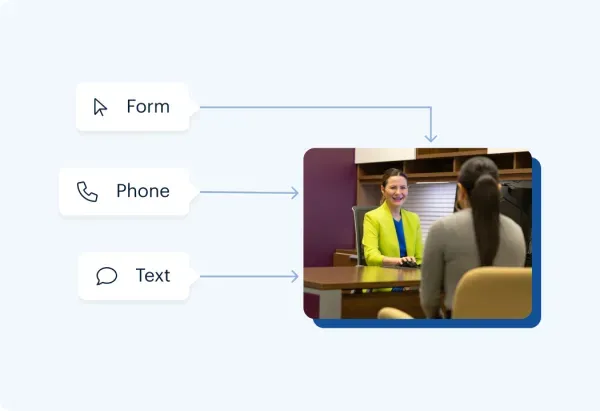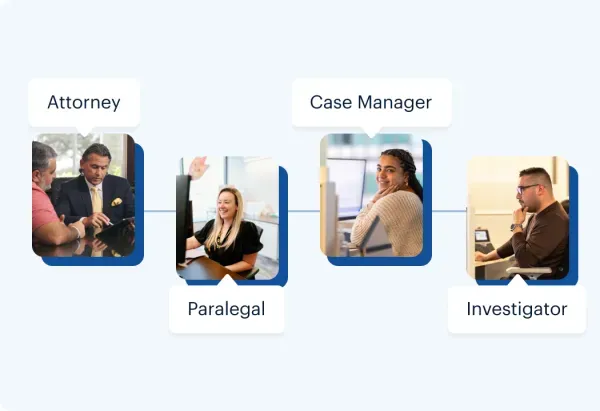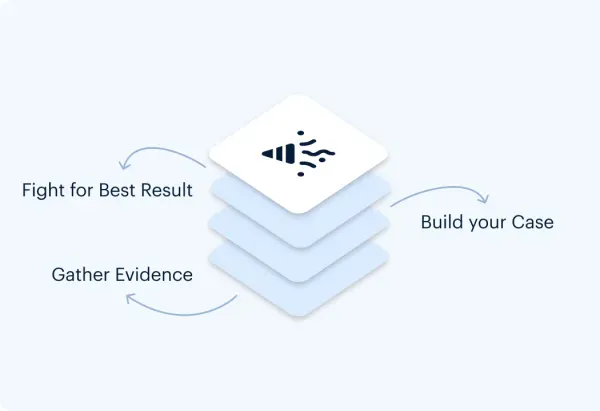Results may vary depending on your particular facts and legal circumstances. The attorney featured above is licensed in Florida. For a full list of attorneys in your state please visit our attorney page.
EVANSVILLE CONSTRUCTION ACCIDENT LAWYER
We help construction workers fight for the medical care and lost wages they need.
Results may vary depending on your particular facts and legal circumstances. The attorney featured above is licensed in Florida. For a full list of attorneys in your state please visit our attorney page.
Evansville, IN Construction Accident Lawyers
Construction accidents are unfortunately quite common and can lead to serious injuries. Despite the fact that most of these accidents are preventable, they continue to happen. From electrical issues to falling objects, the danger is prevalent and can affect workers and passersby alike. If you were injured on a construction site—either as a worker, bystander, or passerby—you may be entitled to collect monetary compensation through a personal injury lawsuit or a workers’ compensation claim.
If you find yourself in this situation, it’s a good idea to speak with experienced Evansville, IN construction accident lawyers right away. The attorneys at Morgan & Morgan have decades of experience handling all types of construction accident injuries, from workers’ compensation and personal injury claims to defective product claims. Whatever the situation is, we can help. Contact Morgan & Morgan today to schedule a free and confidential consultation.
150,000+ Five Star Reviews
The reasons why clients trust Morgan & Morgan.
Results may vary depending on your particular facts and legal circumstances. Based on select nationwide reviews.
Our Results
How It Works
Unsure what to do next? With 35 years of experience, our personal
injury lawyers will guide you every step of the way.

Contact Us 24/7 - It’s Free
Start your claim

Meet your dedicated attorney
Meet the attorneys

We fight for more
Learn more about the case process
Results may vary depending on your particular facts and legal circumstances. The attorneys shown in these photos may not be licensed in your state. To find an attorney licensed in your area, please visit our attorney page.
Local Care
Backed by America’s Largest Injury Law Firm.
$30 Billion
Recovered for clients
nationwide700,000+
Clients and families
served1,000+
Attorneys across
the country1
Click may change your life
The attorney featured above is licensed in Florida. For a full list of attorneys in your state please visit our attorney page.
Results may vary depending on your particular facts and legal circumstances.
Learn More
Injured and not sure what to do next?
We'll guide you through everything you need to know.
Can I File a Workers’ Compensation Claim?
If you are a worker who was injured on a construction site, you may be entitled to workers’ compensation benefits. Almost all businesses in Indiana are required to provide workers’ compensation insurance to their workers. However, the construction industry can be quite different, as many workers are considered independent contractors or work for themselves. Who you’re employed by and how you’re classified will determine if you’re eligible. As one of the most dangerous industries to work in, construction workers should know how they’re classified and if they’re entitled to benefits should an injury occur.
Employee vs. Independent Contractor
In Indiana, independent contractors do not have the right to workers’ compensation insurance; only those who are considered employees are covered. The IRS makes a distinction between independent contractors and employees, stating that you’re probably an independent contractor if you perform services and the payer can control or direct only the result of the work, not what will be done and how it will be done. While this may not always be the case, this is a good rule of thumb to determine if you’re an independent contractor or an employer.
Workers’ Comp Claim – What to Do After an Injury
If you’re considered an employee and are covered by workers’ compensation insurance, there are certain steps that are crucial to take after an injury to ensure that you receive the benefits you’re entitled to. When injured in a construction accident, take the following steps:
- Seek Medical Treatment. The first thing you should do after an injury is to seek treatment to make sure you get the help you need. If you need to go to the emergency room for immediate care, you should do so and can see any doctor that is provided for you. However, once you are stable, your employer has the right to choose which healthcare professional you see for any further care. This is important, as you want to make sure you’re taking all the necessary steps to receive the coverage you deserve.
- Notify Your Employer. After you seek initial emergency treatment, the next step you must take is to notify your employer of your injury. When injured at work in Indiana, you must do this within 30 days of the injury. If you fail to notify your employer on time, you could be barred from recovering any benefits.
- Collect Evidence. If possible, you should collect evidence of your injuries and of the circumstances surrounding the injury. This might include photographs, video footage, or witness statements. Anything that will help corroborate your account of how the injury occurred will be helpful.
- Keep Good Notes. Always keep notes about your injury and the effect it is having on your life. How much pain are you in? What is the prognosis from the doctor? What can you not do because of your injury? The more detail, the better.
- Don’t Miss the Deadline. In addition to notifying your employer, you must also file your workers’ compensation claim within a specified timeframe to obtain benefits. In Indiana, you must file your claim within 2 years of the date of the injury. Don’t miss this date or you will miss out on compensation and other benefits that you would otherwise be entitled to.
Workers’ compensation claims can seem straightforward, but there are often complexities that you’re unaware of. If you were injured on the job, it’s always a good idea to speak with experienced Evansville, IN construction accident lawyers as soon as possible to determine your next steps.
Can I File a Personal Injury Claim?
If you were injured on a construction site as a bystander or a passerby, you may be eligible to file a personal injury claim to recover monetary compensation. Common construction injuries include getting hit by falling debris and slip and falls due to uneven pavement and potholes. To be successful in a personal injury claim, you must prove that the owner of the property or another responsible party caused your injuries through their negligence. To prove negligence, you must show the following elements in court:
Duty of Care. The first element you must prove is that the person or company you’re filing a claim against owed you a duty of care. This element is relatively easy to prove. Whoever is responsible for the construction site has a duty to keep passersby safe by securing the site, making sure objects aren’t falling, and ensuring that the pavement and property around the site aren’t dangerous.
Breach. The next element you must prove is that the defendant breached this duty of care. If you were injured in a slip and fall, for example, you could show that they breached the duty of care by providing photographs of uneven pavement and large potholes that weren’t enclosed.
Injuries. Next, you must prove that you suffered injuries. If you fell but weren’t injured, this isn’t enough to be successful in a personal injury claim. You must have been injured and suffered losses.
Causation. Finally, you must prove causation. It’s not enough that the defendant was negligent and that you were injured; you must prove that the negligence caused your injuries.Statute of Limitations
If you wish to file a personal injury claim as a result of a construction accident, you must do so before the deadline or you won’t be able to recover any monetary compensation. This is known as the statute of limitations. In Indiana, you must file your claim within 2 years of the date of the injury. There are limited exceptions, but this is the deadline in most cases. Always contact an attorney as soon as possible, as time passes quickly and deadlines sometimes are different.
Comparative Negligence
Another important thing to note is that you can still file a claim and recover compensation if you’re partially at fault for the accident and your injuries. Indiana personal injury claims are governed by modified comparative negligence. This means that as long as you are less than 51 percent at fault, you can recover monetary compensation. Your monetary award will be reduced by the percentage that you are deemed to be at fault. For example, if you are awarded $100,000 at the conclusion of the trial and determined to be 20 percent at fault, you will take home 80 percent of the award, or $80,000.
How Much Does a Construction Accident Lawyer Cost?
Almost all personal injury lawyers and workers’ compensation attorneys work on a contingency fee basis. This means that their payment is contingent upon the success of your claim; they only get paid if your case is won or settled. At that point, the attorney takes a percentage of your monetary award as their payment, usually between 30 and 40 percent. This may sound like a lot, but there is no financial risk to you up front, as you will never pay unless you get paid. This allows all people to have access to quality legal representation, regardless of socioeconomic status.
Can I File a Workers’ Comp Claim and a Personal Injury Claim?
In some circumstances, yes. When you file a workers’ compensation claim, you are prohibited from filing a personal injury claim against your employer as well. However, you may be able to file a personal injury claim against a third party if they are responsible for your injuries. For example, if you were injured because of defective machinery, you can file a workers’ comp claim and a product liability claim against the manufacturer of the machinery.
Contact Morgan & Morgan Today
Becoming injured is always a stressful situation, especially if it requires significant medical treatment and requires you to miss work, therefore missing out on a paycheck. If you were injured in a construction accident, you may be entitled to significant monetary compensation. While we understand that money won’t solve everything, you deserve to have the time and energy to focus on healing emotionally and physically without having to worry about financial stress.
At Morgan & Morgan, we can help you seek justice and do everything we can to ensure you receive what you deserve. All our Evansville, IN construction accident lawyers are well-versed in litigating and negotiating and have your best interest at heart. As the largest personal injury firm in America, we have the resources needed to give you the best chance of success. Contact Morgan & Morgan today to schedule a free consultation.














